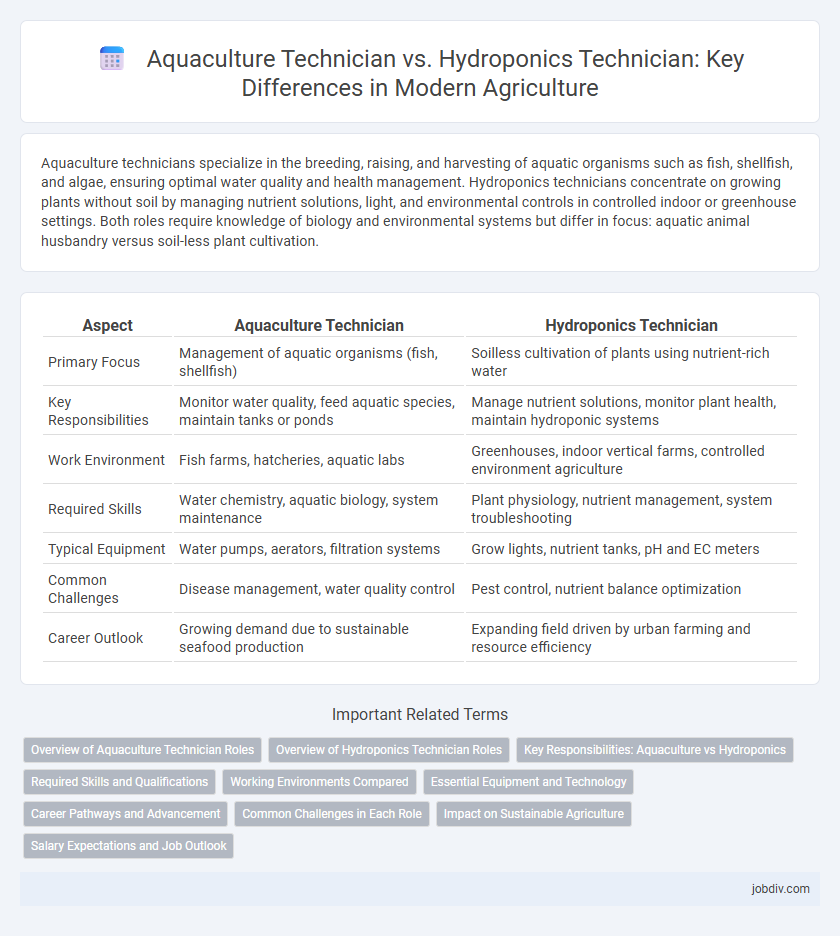Aquaculture technicians specialize in the breeding, raising, and harvesting of aquatic organisms such as fish, shellfish, and algae, ensuring optimal water quality and health management. Hydroponics technicians concentrate on growing plants without soil by managing nutrient solutions, light, and environmental controls in controlled indoor or greenhouse settings. Both roles require knowledge of biology and environmental systems but differ in focus: aquatic animal husbandry versus soil-less plant cultivation.
Table of Comparison
| Aspect | Aquaculture Technician | Hydroponics Technician |
|---|---|---|
| Primary Focus | Management of aquatic organisms (fish, shellfish) | Soilless cultivation of plants using nutrient-rich water |
| Key Responsibilities | Monitor water quality, feed aquatic species, maintain tanks or ponds | Manage nutrient solutions, monitor plant health, maintain hydroponic systems |
| Work Environment | Fish farms, hatcheries, aquatic labs | Greenhouses, indoor vertical farms, controlled environment agriculture |
| Required Skills | Water chemistry, aquatic biology, system maintenance | Plant physiology, nutrient management, system troubleshooting |
| Typical Equipment | Water pumps, aerators, filtration systems | Grow lights, nutrient tanks, pH and EC meters |
| Common Challenges | Disease management, water quality control | Pest control, nutrient balance optimization |
| Career Outlook | Growing demand due to sustainable seafood production | Expanding field driven by urban farming and resource efficiency |
Overview of Aquaculture Technician Roles
Aquaculture technicians manage the breeding, rearing, and harvesting of aquatic organisms such as fish, shellfish, and algae in controlled environments, ensuring optimal water quality and health standards. They conduct regular inspections, monitor growth rates, and implement disease prevention measures to maximize production efficiency in fish farms or hatcheries. Expertise in water chemistry, aquatic biology, and equipment maintenance distinguishes aquaculture technicians from hydroponics technicians, who primarily focus on soil-less plant cultivation.
Overview of Hydroponics Technician Roles
Hydroponics Technicians specialize in soil-less crop production systems, managing nutrient delivery, water quality, and environmental controls to optimize plant growth. They monitor pH levels, nutrient concentrations, and lighting conditions in controlled environments such as greenhouses or indoor farms. Their expertise ensures efficient crop yield, resource conservation, and the integration of technology for sustainable agriculture.
Key Responsibilities: Aquaculture vs Hydroponics
Aquaculture technicians specialize in managing aquatic environments, monitoring water quality, breeding fish and shellfish, and maintaining tanks or ponds to ensure optimal growth conditions. Hydroponics technicians focus on soil-less plant cultivation, controlling nutrient solutions, environmental factors like light and humidity, and maintaining hydroponic systems to maximize crop yield and health. Both roles require expertise in system design and maintenance but differ in the organisms they support and specific environmental parameters managed.
Required Skills and Qualifications
Aquaculture Technicians require skills in water quality management, fish health assessment, and knowledge of aquatic species breeding techniques, often holding certifications in aquaculture or marine biology. Hydroponics Technicians need expertise in nutrient management, plant propagation, and controlled environment agriculture, usually backed by qualifications in horticulture or agricultural technology. Both roles demand proficiency in monitoring systems, data analysis, and adherence to environmental regulations specific to their respective fields.
Working Environments Compared
Aquaculture technicians typically work in aquatic environments such as fish farms, hatcheries, and natural water bodies, managing fish health and water quality to optimize production. Hydroponics technicians operate in controlled indoor or greenhouse settings, focusing on soil-less plant cultivation using nutrient-rich water solutions to maximize crop yield. Both roles require specialized monitoring but differ significantly in their environmental conditions, with aquaculture emphasizing water ecosystems and hydroponics prioritizing climate-controlled plant growth systems.
Essential Equipment and Technology
Aquaculture Technicians rely on specialized equipment such as water quality sensors, aeration systems, and automated feeders to maintain optimal conditions for fish and shellfish cultivation. Hydroponics Technicians utilize advanced technology including nutrient film technique (NFT) systems, grow lights, and climate control units to manage soilless crop production efficiently. Both roles require proficiency in monitoring environmental parameters and maintaining equipment to ensure sustainable agricultural outputs.
Career Pathways and Advancement
Aquaculture technicians specialize in breeding, raising, and caring for aquatic animals such as fish and shellfish, often advancing to roles in hatchery management or aquatic health research. Hydroponics technicians focus on soil-free plant cultivation, with career advancement opportunities in controlled environment agriculture and sustainable farming technology development. Both career pathways demand technical expertise and offer growth into supervisory or specialized research positions within the agriculture sector.
Common Challenges in Each Role
Aquaculture technicians often face challenges related to water quality management, disease control, and maintaining optimal conditions for aquatic species growth. Hydroponics technicians struggle with nutrient solution balance, pest management in soil-less systems, and ensuring consistent environmental parameters such as humidity and light. Both roles require expertise in monitoring and adjusting critical factors to maximize productivity and prevent crop or stock loss.
Impact on Sustainable Agriculture
Aquaculture Technicians contribute to sustainable agriculture by cultivating aquatic organisms, enhancing food security through efficient water use and reducing pressure on wild fish populations. Hydroponics Technicians support sustainable agriculture by enabling soil-free crop production that minimizes water consumption, reduces pesticide use, and allows year-round growing in controlled environments. Both roles drive innovation in resource-efficient food production, promoting environmental conservation and resilience in agricultural systems.
Salary Expectations and Job Outlook
Aquaculture Technicians typically earn an average salary ranging from $35,000 to $50,000 annually, with demand driven by the growing seafood industry and sustainability initiatives. Hydroponics Technicians can expect salaries between $30,000 and $45,000, supported by the expansion of indoor farming and controlled environment agriculture. Job outlook for both roles is positive, with projected growth rates of 8-12% over the next decade due to increasing interest in sustainable food production and technological advancements.
Aquaculture Technician vs Hydroponics Technician Infographic

 jobdiv.com
jobdiv.com